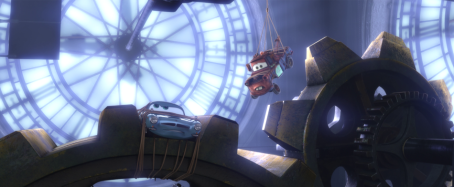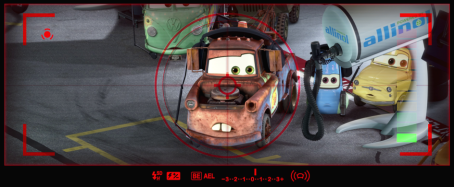 “I waited for the DVD”. An unremarkable statement in this day and age, particulary from me; I don’t go to the cinema often, maybe once or twice in a usual year. The exceptions must be very special indeed, and Pixar films fit the bill for almost a decade. But Cars 2 is an exception. I waited partly because I was quite busy when it came out, partly because of the tepid reviews, but mostly because it just didn’t seem special enough.
“I waited for the DVD”. An unremarkable statement in this day and age, particulary from me; I don’t go to the cinema often, maybe once or twice in a usual year. The exceptions must be very special indeed, and Pixar films fit the bill for almost a decade. But Cars 2 is an exception. I waited partly because I was quite busy when it came out, partly because of the tepid reviews, but mostly because it just didn’t seem special enough.
I’m no hater of the original Cars (2006). Sure, its world doesn’t make a lick of sense, but the film is pretty to look at and its story and message are solid, if not overly original. And while the Larry the Cable Guy-voiced Mater the tow truck may be annyoing, he’s merely a supporting player, vastly overshadowed by Paul Newman’s character.
Instead of rehashing the original’s plot in a different setting, as too many sequels do, Cars 2 tries to do something a little different, namely, to do an elaborate hommage to spy movies: Cars protagonist Lightning McQueen and his crew take part in a worldwide racing tournament meant to showcase a new alternative fuel. Unbeknownst to them, a nefarious plot to sabotage the races and change the world is already underway, and it involves James-Bond-type villains, their goons, and a handful of good spies who try to stop them.

That improbable conceit works surprisingly well in that the film doesn’t just reference previous spy films in the lazy way too many animations are accustomed to, Cars 2 is a genuine entry into the genre. It’s mostly a spy comedy, of course, but never a parody; the plot is delightfully convoluted, but not any more over-the-top than similar schemes in ostensibly serious secret agent films, and there are a number of unironic serious scenes like minor characters dying or being tortured. The two new protagonists, British spy cars voiced by Michael Caine and Emily Mortimer, respectively, are good additions to the cast. Their characterisations aren’t particularly deep, but they’re fun to watch. Michael Giacchino’s spy theme is quite catchy, too, though it’s also overused throughout the film.
The execution has one major flaw, however: The creators made the somewhat baffling decision to not only bring back Mater, but turn him into the main character. In a plot line pilfered from North by Northwest (1959), Mater is mistaken for an American agent and thus involved in the mystery. The main problem with this is that Hitchcock’s film makes it work because the protagonist is a pretty average guy with a boatload of charm. Mater, on the other hand, is a simpleton, getting out of hairy situations mostly by messing up without consequences. The movie goes to the “lovable redneck idiot” well too many times. It’s not funny to see Mater make a fool of himself internationally, it’s mortifying.
The issue is addressed by the film, first when Lightning McQueen more or less removes Mater from his crew because he’s embarassed by his antics (and also because they cost him the victory in the first race), and later when Mater himself has the realisation that he’s seen as a clown by everyone around him. Unfortunately, this potential bit of character development is undercut by how the film’s message is verbalised, with McQueen shown as wrong in his anger. The trouble with this is that McQueen’s annoyance is perfectly justified, and Mater is a buffoon whose naivety is more grating than his voice and whose ignorance of manners and decorum may not be intentional, but is nonetheless disrespectful to his friends and to members of the foreign cultures he’s visiting. His behaviour should rightfully cause anyone associated with him embarassment, including himself. That should have been the emotional core of the movie, but it’s tossed aside in favour of Mater saving the day with his Mater-ness. “Anyone should be allowed to remain ‘himself’ no matter the circumstances” is a terrible message and unworthy of Pixar in its simple-mindedness.

What we have, then, is a movie that isn’t awful, but the surface entertainment of which is marred by a subplot that would have been better left on the cutting room floor (resp. its animation equivalent). Much like the original Cars is underrated, its sequel isn’t quite as bad as the critical consensus makes it seem; I imagine critics were quite happy for the excuse to finally declare Pixar’s winning streak over. But it’s just not particularly special, and still an unnecessary mis-step that hopefully isn’t a sign of things to come.
